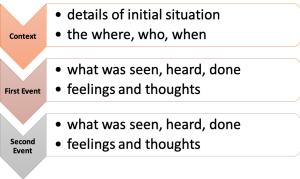14 Planning and Drafting the Narrative
The Outline
Once you have decided a topic for your narrative essay, before you start to write, you should develop a plot outline showing the significant event of your narrative.

The Thesis Statement
Ensure that your narrative essay express a main point. Your thesis statement should have a controlling idea. For example:
topic controlling idea
The day I decided to get a new job, my life took a dramatic turn.
controlling idea topic
Sadie’s problem began as soon as she drove here new car home.
 How to make a point
How to make a point
In a narrative essay, the thesis statement should make a point. To help you find the controlling idea, you can ask yourself the following questions:
- What did I learn?
- How did it make me feel?
- How did I change?
- What is important about it?
For example:
Topic: ran away from home
Possible controlling idea: learned the importance of family
Topic controlling idea
When I ran away from home at the age of fifteen, I learned the importance of my family.
 Writing Exercise: Writing Thesis Statements
Writing Exercise: Writing Thesis Statements
Write a thesis statement for each of the following topics. Each thesis statement should mention the topic and express a controlling idea.
Example: Topic: A memorable moment
Thesis Statement: I made a mistake when I ran away from home to meet a pen pal.
- Topic: An emotional ceremony
Thesis Statement: ______________________________________________________
- Topic: A significant experience
Thesis Statement: _______________________________________________________
- Topic: An adventure with a friend
Thesis Statement: _______________________________________________________
The Supporting ideas
A narrative essay should contain specific details so that the reader understands what happened. To come up with the details, ask yourself a series of questions and then answer them as you plan your essay.
- Who is the essay about?
- What happened?
- When did it happen?
- Where did it happen?
- Why did it happen?
- How did it happen?
 Here are some tips to remember as you develop your narrative essay.
Here are some tips to remember as you develop your narrative essay.
- Do not simply recount what happened. Reflect on why the event is important.
- Consider the main source of tension in your narrative. Descriptions of conflict or tension can help engage the reader.
- To make your essay more powerful, use descriptive language that appeals to the senses.
 Writing Exercise: Developing Supporting Ideas
Writing Exercise: Developing Supporting Ideas
Choose one of your thesis statements from the exercise above, and generate supporting ideas. List what happened.
Example:
Thesis Statement: When I ran away from home at the age of fifteen, I learned the importance of my family.
Supporting Details:
– had an argument with parents
– decided to run away from home
– packed my stuff and left a note
– went to arcade to play games
– ran out of money
– tried to find a job
– my father came to take me back home
– had a conversation with parents
– apologized to each other
– realized the importance of family
Topic:
Thesis Statement:
Supporting details:
–
–
–
Useful transitional words in narrative essays
Narrative writing often follows a chronological order. Here is a list of transitions that are useful in narrative essays.
| To show a sequence of events |
| after that finally in the end meanwhile afterward first next
eventually in the beginning later then last |

